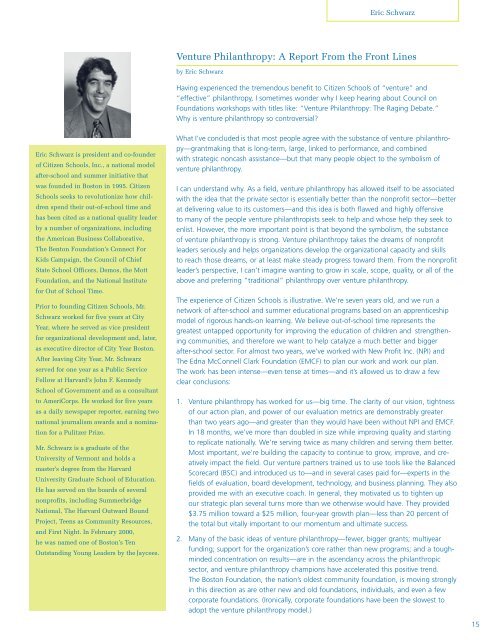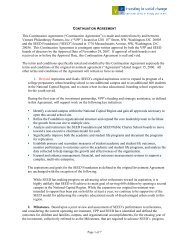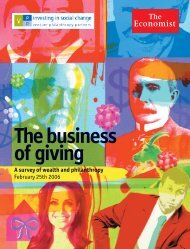Introduction, Essays on High-Engagement Grantmaking - Venture ...
Introduction, Essays on High-Engagement Grantmaking - Venture ...
Introduction, Essays on High-Engagement Grantmaking - Venture ...
Create successful ePaper yourself
Turn your PDF publications into a flip-book with our unique Google optimized e-Paper software.
Eric Schwarz<br />
<strong>Venture</strong> Philanthropy: A Report From the Fr<strong>on</strong>t Lines<br />
by Eric Schwarz<br />
Having experienced the tremendous benefit to Citizen Schools of “venture” and<br />
“effective” philanthropy, I sometimes w<strong>on</strong>der why I keep hearing about Council <strong>on</strong><br />
Foundati<strong>on</strong>s workshops with titles like: “<strong>Venture</strong> Philanthropy: The Raging Debate.”<br />
Why is venture philanthropy so c<strong>on</strong>troversial<br />
Eric Schwarz is president and co-founder<br />
of Citizen Schools, Inc., a nati<strong>on</strong>al model<br />
after-school and summer initiative that<br />
was founded in Bost<strong>on</strong> in 1995. Citizen<br />
Schools seeks to revoluti<strong>on</strong>ize how children<br />
spend their out-of-school time and<br />
has been cited as a nati<strong>on</strong>al quality leader<br />
by a number of organizati<strong>on</strong>s, including<br />
the American Business Collaborative,<br />
The Bent<strong>on</strong> Foundati<strong>on</strong>’s C<strong>on</strong>nect For<br />
Kids Campaign, the Council of Chief<br />
State School Officers, Demos, the Mott<br />
Foundati<strong>on</strong>, and the Nati<strong>on</strong>al Institute<br />
for Out of School Time.<br />
Prior to founding Citizen Schools, Mr.<br />
Schwarz worked for five years at City<br />
Year, where he served as vice president<br />
for organizati<strong>on</strong>al development and, later,<br />
as executive director of City Year Bost<strong>on</strong>.<br />
After leaving City Year, Mr. Schwarz<br />
served for <strong>on</strong>e year as a Public Service<br />
Fellow at Harvard’s John F. Kennedy<br />
School of Government and as a c<strong>on</strong>sultant<br />
to AmeriCorps. He worked for five years<br />
as a daily newspaper reporter, earning two<br />
nati<strong>on</strong>al journalism awards and a nominati<strong>on</strong><br />
for a Pulitzer Prize.<br />
Mr. Schwarz is a graduate of the<br />
University of Verm<strong>on</strong>t and holds a<br />
master’s degree from the Harvard<br />
University Graduate School of Educati<strong>on</strong>.<br />
He has served <strong>on</strong> the boards of several<br />
n<strong>on</strong>profits, including Summerbridge<br />
Nati<strong>on</strong>al, The Harvard Outward Bound<br />
Project, Teens as Community Resources,<br />
and First Night. In February 2000,<br />
he was named <strong>on</strong>e of Bost<strong>on</strong>’s Ten<br />
Outstanding Young Leaders by the Jaycees.<br />
What I’ve c<strong>on</strong>cluded is that most people agree with the substance of venture philanthropy—grantmaking<br />
that is l<strong>on</strong>g-term, large, linked to performance, and combined<br />
with strategic n<strong>on</strong>cash assistance—but that many people object to the symbolism of<br />
venture philanthropy.<br />
I can understand why. As a field, venture philanthropy has allowed itself to be associated<br />
with the idea that the private sector is essentially better than the n<strong>on</strong>profit sector—better<br />
at delivering value to its customers—and this idea is both flawed and highly offensive<br />
to many of the people venture philanthropists seek to help and whose help they seek to<br />
enlist. However, the more important point is that bey<strong>on</strong>d the symbolism, the substance<br />
of venture philanthropy is str<strong>on</strong>g. <strong>Venture</strong> philanthropy takes the dreams of n<strong>on</strong>profit<br />
leaders seriously and helps organizati<strong>on</strong>s develop the organizati<strong>on</strong>al capacity and skills<br />
to reach those dreams, or at least make steady progress toward them. From the n<strong>on</strong>profit<br />
leader’s perspective, I can’t imagine wanting to grow in scale, scope, quality, or all of the<br />
above and preferring “traditi<strong>on</strong>al” philanthropy over venture philanthropy.<br />
The experience of Citizen Schools is illustrative. We’re seven years old, and we run a<br />
network of after-school and summer educati<strong>on</strong>al programs based <strong>on</strong> an apprenticeship<br />
model of rigorous hands-<strong>on</strong> learning. We believe out-of-school time represents the<br />
greatest untapped opportunity for improving the educati<strong>on</strong> of children and strengthening<br />
communities, and therefore we want to help catalyze a much better and bigger<br />
after-school sector. For almost two years, we’ve worked with New Profit Inc. (NPI) and<br />
The Edna McC<strong>on</strong>nell Clark Foundati<strong>on</strong> (EMCF) to plan our work and work our plan.<br />
The work has been intense—even tense at times—and it’s allowed us to draw a few<br />
clear c<strong>on</strong>clusi<strong>on</strong>s:<br />
1. <strong>Venture</strong> philanthropy has worked for us—big time. The clarity of our visi<strong>on</strong>, tightness<br />
of our acti<strong>on</strong> plan, and power of our evaluati<strong>on</strong> metrics are dem<strong>on</strong>strably greater<br />
than two years ago—and greater than they would have been without NPI and EMCF.<br />
In 18 m<strong>on</strong>ths, we’ve more than doubled in size while improving quality and starting<br />
to replicate nati<strong>on</strong>ally. We’re serving twice as many children and serving them better.<br />
Most important, we’re building the capacity to c<strong>on</strong>tinue to grow, improve, and creatively<br />
impact the field. Our venture partners trained us to use tools like the Balanced<br />
Scorecard (BSC) and introduced us to—and in several cases paid for—experts in the<br />
fields of evaluati<strong>on</strong>, board development, technology, and business planning. They also<br />
provided me with an executive coach. In general, they motivated us to tighten up<br />
our strategic plan several turns more than we otherwise would have. They provided<br />
$3.75 milli<strong>on</strong> toward a $25 milli<strong>on</strong>, four-year growth plan—less than 20 percent of<br />
the total but vitally important to our momentum and ultimate success.<br />
2. Many of the basic ideas of venture philanthropy—fewer, bigger grants; multiyear<br />
funding; support for the organizati<strong>on</strong>’s core rather than new programs; and a toughminded<br />
c<strong>on</strong>centrati<strong>on</strong> <strong>on</strong> results—are in the ascendancy across the philanthropic<br />
sector, and venture philanthropy champi<strong>on</strong>s have accelerated this positive trend.<br />
The Bost<strong>on</strong> Foundati<strong>on</strong>, the nati<strong>on</strong>’s oldest community foundati<strong>on</strong>, is moving str<strong>on</strong>gly<br />
in this directi<strong>on</strong> as are other new and old foundati<strong>on</strong>s, individuals, and even a few<br />
corporate foundati<strong>on</strong>s. (Ir<strong>on</strong>ically, corporate foundati<strong>on</strong>s have been the slowest to<br />
adopt the venture philanthropy model.)<br />
15






